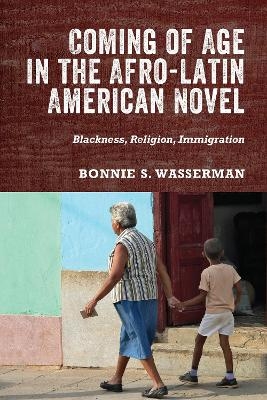
Coming of Age in the Afro-Latin American Novel
Blackness, Religion, Immigration
Seiten
2022
University of Rochester Press (Verlag)
978-1-64825-028-6 (ISBN)
University of Rochester Press (Verlag)
978-1-64825-028-6 (ISBN)
Explores the dimensions of the coming-of-age novel in the Spanish-speaking Caribbean and Brazil, focusing on works by eight major Afro-Latin American writers
The centuries-old European genre of the coming-of-age story has been transformed by contemporary Afro-Latin American novelists to address key aspects of the diaspora in various nations of the Caribbean and Latin America. While attention to Afro-Hispanic and Afro-Brazilian literature has increased in recent decades, few critics have focused specifically on the Afro-Latin American Bildungsroman, and fewer still have addressed novels from both Spanish- and Brazilian-speaking regions, as author Bonnie Wasserman does in this study.
The memory and continuing impact of slavery especially shape these coming-of-age stories. Often interwoven with race is a focus on religion, particularly the importance of African folk religions and traditions in the lives of young people. Immigration-and the return journey-is another important theme in the novels.
Coming of Age in the Afro-Latin American Novel discusses works&emdash;all published around the turn of the 21st century&emdash;by such important writers as Dahlma Llanos-Figueroa and Mayra Santos-Febres (from Puerto Rico), Conceição Evaristo and Paulo Lins (from Brazil); Teresa Cardenas and Pedro Pérez Sarduy (from Cuba); and Junot Diaz and Rita Indiana (from the Dominican Republic). Wasserman's far-reaching analysis is both rigorous and compassionate, shedding a clear light on ways in which descendants of Africans have experienced life in the New World.
The centuries-old European genre of the coming-of-age story has been transformed by contemporary Afro-Latin American novelists to address key aspects of the diaspora in various nations of the Caribbean and Latin America. While attention to Afro-Hispanic and Afro-Brazilian literature has increased in recent decades, few critics have focused specifically on the Afro-Latin American Bildungsroman, and fewer still have addressed novels from both Spanish- and Brazilian-speaking regions, as author Bonnie Wasserman does in this study.
The memory and continuing impact of slavery especially shape these coming-of-age stories. Often interwoven with race is a focus on religion, particularly the importance of African folk religions and traditions in the lives of young people. Immigration-and the return journey-is another important theme in the novels.
Coming of Age in the Afro-Latin American Novel discusses works&emdash;all published around the turn of the 21st century&emdash;by such important writers as Dahlma Llanos-Figueroa and Mayra Santos-Febres (from Puerto Rico), Conceição Evaristo and Paulo Lins (from Brazil); Teresa Cardenas and Pedro Pérez Sarduy (from Cuba); and Junot Diaz and Rita Indiana (from the Dominican Republic). Wasserman's far-reaching analysis is both rigorous and compassionate, shedding a clear light on ways in which descendants of Africans have experienced life in the New World.
BONNIE S. WASSERMAN is Assistant Professor of Africana Studies at the University of Arizona.
Introduction
1. The Intergenerational Bildungsroman in Daughters of the Stone and Ponciá Vicencio
2. The Epistolary Afro-Cuban Bildungsroman
3. Boys to Men: Masculinity in The Brief Wondrous Life of Oscar Wao and City of God
4. Reinventing the Afro-Latin American Bildungsroman
Conclusion
Bibliography
Index
| Erscheinungsdatum | 04.05.2022 |
|---|---|
| Reihe/Serie | Rochester Studies in African History and the Diaspora |
| Verlagsort | Rochester |
| Sprache | englisch |
| Maße | 152 x 229 mm |
| Gewicht | 328 g |
| Themenwelt | Geisteswissenschaften ► Geschichte ► Regional- / Ländergeschichte |
| Geisteswissenschaften ► Sprach- / Literaturwissenschaft ► Anglistik / Amerikanistik | |
| Geisteswissenschaften ► Sprach- / Literaturwissenschaft ► Literaturwissenschaft | |
| Sozialwissenschaften ► Soziologie | |
| ISBN-10 | 1-64825-028-9 / 1648250289 |
| ISBN-13 | 978-1-64825-028-6 / 9781648250286 |
| Zustand | Neuware |
| Informationen gemäß Produktsicherheitsverordnung (GPSR) | |
| Haben Sie eine Frage zum Produkt? |


